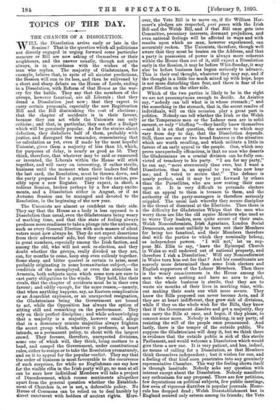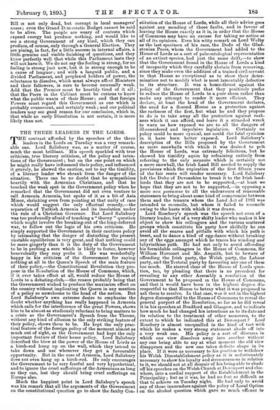TOPICS OF THE DAY.
THE CHANCES OF A DISSOLUTION.
WILL the Dissolution arrive early or late in the Session? That is the question which all politicians not directly engaged in urging forward some particular measure or Bill are now asking of themselves or their neighbours, and the answer usually, though not quite always, is in accordance with the wishes of the man who replies. The majority of Gladstonians, for example, believe that, in spite of all sinister predictions, the Session will run to its lees, and then be enlivened by a short and sharp debate on the House of Lords, ending in a Dissolution, with Reform of that House as the war- cry for the battle. They say that the members of the eroups, however fanatical, are all Liberals ; that they dread a Dissolution just now ; that they expect to carry certain proposals, especially the new Registration Bill and the Bill diminishing the cost of elections ; that the chapter of accidents is in their favour, because they can act while the Unionists can only criticise ; and that, in particular, they can offer a Budget which will be genuinely popular. As for the stories about defection, they disbelieve half of them, probably with justice, and disregard the remainder, remembering that no calculation as yet, even if made by the most hopeful Unionist, gives them a majority of less than 15, which, for purposes of delay, is nearly as good as 50. They think, therefore, that whatever may be said or rumoured or invented, the Liberals within the House will stick together, and will carry on interesting, if rather sterile, business until the moment when their leaders feel that the last card, the Resolution, must be thrown down, and the party prepared for a great appeal to the nation, pos- sibly upon a new Register. They expect, in short, a tedious Session, broken perhaps by a few sharp excite- ments, and a Dissolution either in August, or if an Autumn Session can be managed and devoted to the Resolution, in the beginning of the new year.
The Unionists are almost as confident on their side. They say that the House as a body is less opposed to a Dissolution than usual, even the Gladstonians being weary of marking time, and that this state of feeling always produces more readiness to take a plunge into the unknown, such as every General Election with such masses of silent voters must now always be. They do not expect desertions from their adversaries' side, but they expect abstentions in great numbers, especially among the Irish faction, and among the old, who will not seek re-election, and they doubt whether the groups, really divided as they are, can, for months to come, keep step even sullenly together. Some sharp and bitter quarrel is certain to arise, most probably originating in some humanitarian subject,—the condition of the unemployed, or even the atrocities in Armenia, both subjects upon which some men are sure to cast party obligations to the winds. They hold, like their rivals, that the chapter of accidents must be in their own favour ; and oddly enough, for the same reason,—namely, that when anything happens, say, an Eastern complication or an Anarchist explosion, or an unexpected resignation, the Gladstonians being the Government are bound to act, while the Opposition has always the option of sitting still and remarking on the performance. They rely on their perfect discipline ; and while acknowledging that a majority is a majority, however small, allege that in a democracy minute majorities always frighten the secret group which, whatever it professes, at heart intends, as a permanent policy, to shout with the largest crowd. They foresee, therefore, unexpected divisions, some one of which will, they think, bring matters to a head, and compel the Government, under constitutional rules, either to resign or to take the Resolution prematurely, and on it to appeal for the popular verdict. They say that the order of business is most favourable to the occurrence of such surprises, for while no Englishman can say how far the visible rifts in the Irish party will go, no man at all can be sure how individual Members will take a project of Disendowment, which rouses sentiments altogether apart from the general question whether the Establish- ment of Churches is, or is not, a defensible policy. No House of .Commons can be relied on to deal harshly by direct enactment with holders of ancient rights. More- over, the Veto Bill is to move on, if Sir William Har- court's pledges are respected, pan i passu, with the Irish Bill and the Welsh Bill, and if that Bill once gets into Committee, pecuniary interests, dormant prejudices, and even national feelings will be affected in ways and with results upon which no man, however experienced, can accurately reckon. The Unionists, therefore, though well aware that they must be beaten on the Address, and that a party in possession of power is always more coherent within the House than out of it, still expect a Dissolution early in the Session, it may be before Whit-Sunday, it may also be before business has begun seriously to advance. This is their real thought, whatever they may say, and if the thought is a little too much mixed up with hope, hope is not more disturbing than fear, and there is fear of the great Election on the other side.
Which of the two parties is likely to be in the right we are not presumptuous enough to decide. As Asiatics say, "nobody can tell what is in whose stomach ; " and the something in the stomach, that is, the secret resolve of individuals, will on this occasion play a great part in polities. Nobody can tell whether the Irish or the Welsh or the Temperance men or the Labour men are in solid earnest, or only "bluffing "—they hardly know themselves —and it is on that question, the answer to which may vary from day to day, that the Dissolution depends. Still, there are one or two broad features in the situation which are worth recalling, and which militate a little in favour of an early appeal to the people. One, which may prove unexpectedly efficacious, is that no man who deserts the Gladstonians on a crucial division can be fully con- victed of treachery to his party. "I am for my party," he can say, "more strenuously than ever, but I want a Dissolution, that is, an appeal to you who now hear me ; and I voted to secure that." The defence is nearly perfect, and it may be put forward by others than the Parnellites, who are now resting their case upon it. It is very difficult to persuade electors that an appeal to them is treason to them, and the authority of the party-managers is therefore seriously crippled. The usual lash whereby they secure discipline is the threat of dismissal at the Elections. Then there is the difficulty for Gladstonian Whips that the men who worry them are like the old squire Members who used so to worry Tory leaders, men quite secure of their seats. Welsh Nonconformists, Irish Agrarians, London Social Democrats, are most unlikely to turn out their Members for being too fanatical, and their Members therefore deal with the parties to which they nominally belong, as independent powers. I will not,' let us sup- pose Mr. Ellis to say, leave the Episcopal Church in Wales so well endowed out of national property, and therefore I risk a Dissolution.' Will any Nonconformist in Wales turn him out for that ? And his constituents are scarcely more determined than some Irish electors and English supporters of the Labour Members. Then there is the weary consciousness in the House among the men who want nothing and have no axes to grind, that the whole business is sterile, that they are to waste six months of their lives in marking time, with- out making their seats one whit more secure. They know the Bills proposed can never become Acts, and if they are at heart indifferent, they grow sick of divisions, while if they on the whole wish for the Bills, they know that if the Government dissolve and get a majority, they can carry the Bills at once, and begin, if they please, to concoct some more. Nobody is thinking, in any party, of resisting the will of the people once pronounced. And lastly, there is the temper of the outside public. We suppose the Gladstonians will deny it, but we think there is evidence that the outside public is sick of this sterile Parliament, and would welcome a Dissolution which would give them a new one. It is very patient, and has, indeed, no means of calling for a Dissolution, so that Members think themselves independent ; but it wishes for one, and a feeling of that kind soon penetrates into any genuinely representative Chamber. The way the feeling shows itself is through lassitude. Nobody asks any question with interest except about the Dissolution. Nobody manifests any enthusiasm for any proposal. There are few petitions, few deputations on political subjects, few public meetings, few even of vigorous diatribes in popular journals. Home- rule has dropped dead ; Welsh Disestablishment has in England secured only esteem among its friends; the Veto Bill is not only dead, but corrupt in local managers' noses ; even the Grand Democratic Budget cannot be said to be alive. The people are weary of contests which expend energy but produce nothing, and would like to see a strong Government of any kind, which they can produce, of course, only through a General Election. They are pining, in fact, for a little success in internal affairs, a little genuine and visible finishing of questions, and they know perfectly well that while this Parliament lasts they will not have it. We do not say the feeling is strong, for no feeling is strong just now, but it is strong enough to be a cause of languor ; and with a languid public, and a divided Parliament, and perplexed holders of power, the reluctance to dissolve, which must always affect Ministers and their followers, is sure to become unusually weak. Add that the Premier must be heartily tired of it all ; that the Peers in the Cabinet must be curious to know what the public wants of their House ; and that foreign Powers must regard this Government as one which is probably evanescent, and certainly weak ; and our political readers may see good reason for our conclusion, which is, that while an early Dissolution is not certain, it is more likely than not.







































 Previous page
Previous page